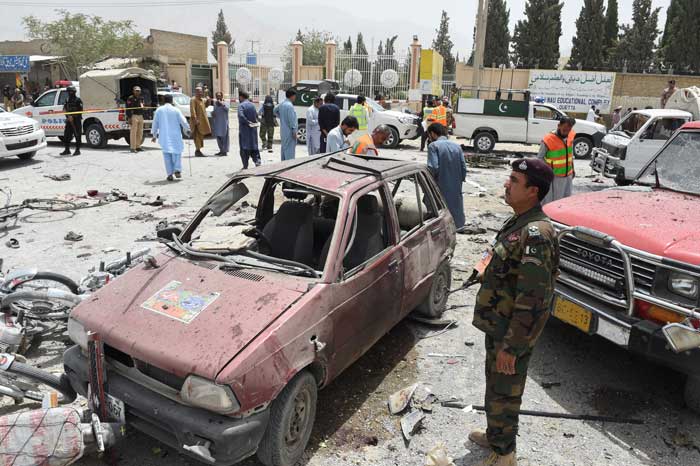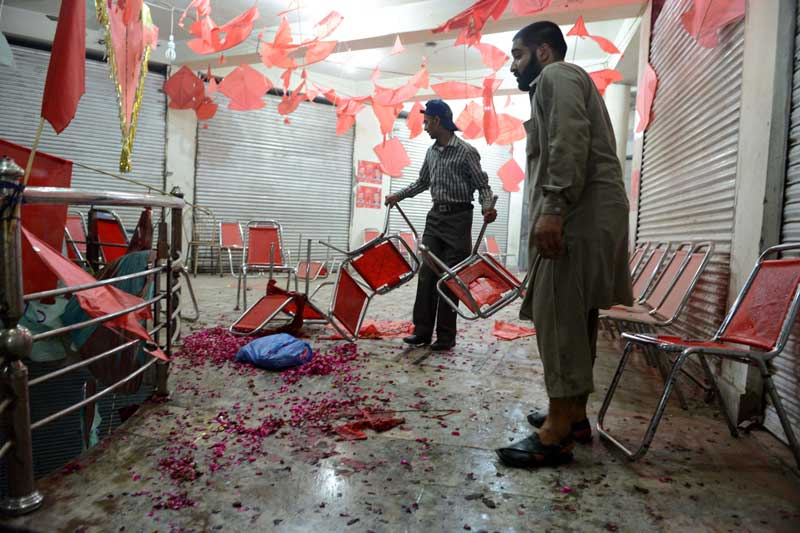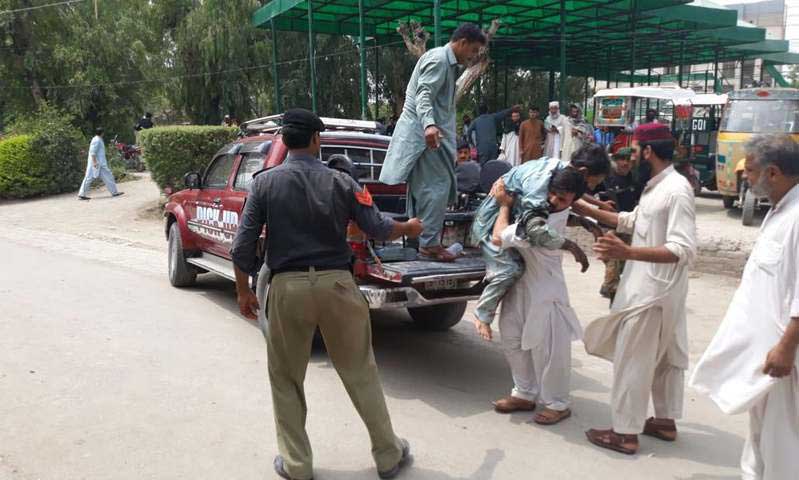Diary of Violence
By Deneb Sumbul | Newsbeat National | Published 7 years ago
As the fifth largest democracy in the world went to the polls on July 25, 2018, Pakistan experienced its second democratic transition, albeit not without its share of election-related violence.
The last elections on May 11, 2013, were said to be one of the bloodiest in Pakistan’s history, claiming 130 lives and scores of people injured in shootings and bomb blasts during the campaigns, and even on election day. The 2018 general elections has more or less mirrored the same trend — except that it has surpassed the previous figures of the number of dead and injured.
As election day drew nearer, a series of violent incidents rocked the country. From the beginning of July 2018, bomb blasts and grenade attacks targeting election candidates and their campaign meetings and rallies, took place with a regularity, particularly in Khyber Pakhtunkhwa (KP) and Balochistan.
In the month of July alone, the reported number of deaths in the days leading up to the 2018 elections as a result of premeditated attacks, including the bomb explosion at a polling station in Quetta on election day, is 213, with more than 423 people injured.
In addition, another two persons were killed and 42 injured on the day of the elections as a result of scuffles and skirmishes that broke out when loyalists of various parties crossed swords with those in the opposition in various cities and towns across the country. The final death toll is estimated to be 215 and the number of injured is 465.

July 3
The first in a series of bomb blasts took place on July 3, as Pakistan Tehreek-e-Insaf (PTI)’s candidate for NA-48 (Tribal Area-IX), Malik Aurangzeb Khan was inaugurating his election office. The convention in Razmak tehsil of North Waziristan district — one of Pakistan’s seven tribal districts bordering Afghanistan — was rocked by a huge blast when a grenade was thrown into a crowd of 100 to 150 of his supporters. While several suffered minor injuries, 10 of the seriously injured were rushed to a nearby hospital. No group however, claimed responsibility for the grenade attack.
July 7
Sherin Malik, Muttahida Majlis-i-Amal (MMA)’s candidate from the PK-89 constituency, came under a bomb attack on July 7, as he was campaigning in the Takhti Kheil area in Bannu. According to the authorities, an explosive device planted on a motorcycle parked on the roadside was detonated by remote control as his convoy was passing by. The MMA leader and six others suffered injuries and were taken to the nearby district hospital in Bannu where their condition was said to be stable. However, yet again no group claimed immediate responsibility for the blast.
July 10
Peshawar’s Yakatoot area witnessed a violent suicide blast on July 10 that killed senior Awami National Party (ANP) leader, Haroon Bilour, and 20 others. Contesting the elections from PK-78, Bilour had just arrived at a corner meeting, when the venue reverberated with the sound of an explosion just as he was about to address his supporters. The injured were immediately rushed to Peshawar’s Lady Reading Hospital, where Bilour succumbed to his injuries and became one of the first casualties of the 2018 election campaigns. An estimated 65 people were injured in the rally.
The banned Tehrik-i-Taliban Pakistan (TTP) claimed responsibility for the calculated suicide attack and its spokesperson, Mohammad Khurasan, said that it was an act of revenge for ANP’s anti-Taliban stance and warned people to stay away from the party’s rallies as he vowed to follow it up with more such attacks. An initial probe revealed that the suicide bomber was a young boy. Bilour’s father, the late Bashir Bilour, also fell victim to a targeted suicide attack in the Qissa Khwani Bazaar in Peshawar in 2012.
July 12
A blast followed by intense firing in Khuzdar, near the election office of Balochistan Awami Party (BAP) on July 12, left two seriously injured. Unknown assailants targeted the campaign office of Agha Shakeel Durrani, one of the BAP leaders contesting the elections from PB-39.
Mohsin Butt, the Balochistan Inspector General of Police, claimed the blast was a terrorist attack by Islamic State (IS), Lashkar-i-Jhangvi (LJ) and subnationalists who were trying to sabotage the election campaigns in the province.
July 13
The third major attack in KP took place in Bannu on July 13, on the convoy of former KP chief minister, Akram Khan Durrani. A blast took place near his vehicle when he was passing through Haved Bazaar, on his way home from an election rally. The blast was said to be the result of an improvised explosive device planted on a motorbike on the road, that was triggered by remote control. Durrani remained unhurt, but the explosion killed four and injured 32 others, who were rushed to the District Headquarter Hospital in Bannu. Three police personnel were among those injured.
Durrani, a former federal minister for housing and works in the previous government, is a Jamiat Ulema-e-Islam-Fazl (JUI-F) leader, who was contesting elections against PTI Chairman Imran Khan from NA-35 Bannu on a MMA ticket.
This is the second time Durrani has been targeted. In 2015, he narrowly escaped a similar suicide attack on his convoy in Nermikhel area, that left two people dead and three injured.

July 13
A second blast the same day — the deadliest in a series leading up to the elections — took place in Balochistan’s Mastung district in the town of Drigarh. An unidentified attacker targeted a corner meeting organised by Nawabzada Siraj Raisani of the Balochistan Awami Party (BAP) — an election candidate for PB-35 Mastung.
A suicide bomber detonated his explosives in the middle of a packed crowd during a political rally. The blast injured close to 200 people including Raisani, who succumbed to his injuries while being shifted to a hospital in Quetta. The final death toll from the explosion rose to 149. The IS claimed responsibility for the attack, as did a faction of the Pakistan Taliban. It is said to be to one of the worst attacks since the Peshawar Army Public School carnage in 2014 that killed 149 people, including 132 children, and injured 114 others.
July 15
On the morning of July 15, Awami National Party (ANP) leader, Daud Khan Achakzai, narrowly escaped an attempt on his life, after being shot at by four unidentified armed men. The ex-senator was asleep at a farmhouse in Pir Alizai area in Qila Abdullah district, Chaman when assailants started firing indiscriminately at him. Achakzai received gunshots wounds on his arm. When his security personnel retaliated, the assailants fled the crime scene. The former Senator was taken to Quetta Civil Hospital’s Trauma Centre and was said to be out of danger after receiving medical aid.
July 16
Unidentified gunman opened fire on the vehicle of former Federal Minister for Parliamentary Affairs, Sheikh Aftab Ahmed, and his son, Sheikh Salman, in Attock. A PML-N candidate for NA-55 seat from Attock, Ahmed was on his way home from a corner meeting in Kamra. After firing two bullets at the vehicle, the lone gunman escaped the scene. Fortunately, both the lawmaker and his son, who is contesting polls from PP-1, remained unhurt.
July 17
The house of a senior leader of BAP, Abdul Ghafoor Khan, in Gwadar town, was fired upon on July 17. Hoti was inside the house when unidentified gunmen opened fire. He remained unhurt but the walls of the house sustained bullet marks. Despite a search operation to catch the perpetrators, no arrests were made and no one claimed responsibility.

July 22
Barely 10 days after the bomb attack on his convoy on July 13, JUI-F leader, Akram Khan Durrani, survived a second assassination attempt. The former KP Chief Minister’s car was shot at in the Basia Kheil area of Bannu where he had planned to conduct door-to-door campaigning for contesting the election on NA-35 Bannu. Fortunately, he again remained unhurt.
July 22
On July 22, a suicide bomber targeted a jeep carrying Sardar Ikramullah Gandapur, PTI’s candidate for PK-99 (DI Khan-V) in his hometown, Dera Ismail Khan. He was headed towards a political meeting near his residence. Gandapur, along with three others, was fatally injured in the blast, reportedly caused by eight to 10 kilogrammes of explosives.
The former minister for agriculture in the KP cabinet was taken to the Combined Military Hospital (CMH) in DI Khan, where he succumbed to his injuries. One of the PTI leader’s critically injured guards also passed away the following day while the others were being treated at the hospital. In 2013, Gandapur’s brother, Israrullah, who was then a provincial law minister, had also been killed in a suicide attack in his hometown.
July 22
Later, the same day, more than 20 people were injured in a grenade attack on the Balochistan Awami Party’s election office in Dalbandin city in Chaghi, Balochistan’s largest district. The apparent target was Sakhi Amanullah, BAP’s candidate for PB-34 who was among the injured.
Unknown attackers threw hand grenades at the crowded party office injuring 20 of the party workers. They were rushed to Chaghi’s Civil Hospital, and four of the critically injured were later moved to Quetta Civil Hospital.
July 24
On the eve of the elections, unknown assailants ambushed a security convoy escorting the election staff and their polling material to NA-271 Buleda, a tehsil of Kech District in Balochistan. They were attacked on reaching the rugged mountainous area close to the Iranian border. In a heavy exchange of fire, three security force personnel were killed, as was a teacher who was on election duty. Among the 14 wounded were nine security force personnel. The attackers managed to escape and no one claimed responsibility for the attack. Later, polling took place at the station as planned, said an official. “Despite the attack, the security forces ensured that the polling staff were moved to the designated place, where the polling continued as per plan,” he added.
July 25
On election day, at 10:55 am, a suicide bomber blew himself up outside the Tameer-e-Nau Public College Complex polling station, near the Eastern Bypass in Quetta. The attacker detonated his suicide vest when the police and the Frontier Corps personnel tried to stop him from entering the polling station. Apart from the queue of voters outside, a large number of people had gathered in the election camps set up by assorted candidates near the polling station. The explosion killed 33 people, half of them instantly, while the remaining breathed their last in the hospitals. More than 70 people sustained multiple injuries from the explosion, which was so powerful that it was heard several kilometers away.
At the time of the blast, the Quetta DIG, Abdul Razzaq Cheema, was visiting the polling station, according to a CTD official, and Cheema may have been the prime target. Polling at the station was suspended. After a few hours delay, the polling process was resumed under heightened security. The IS later claimed responsibility for the attack.
The writer is working with the Newsline as Assistant Editor, she is a documentary filmmaker and activist.


